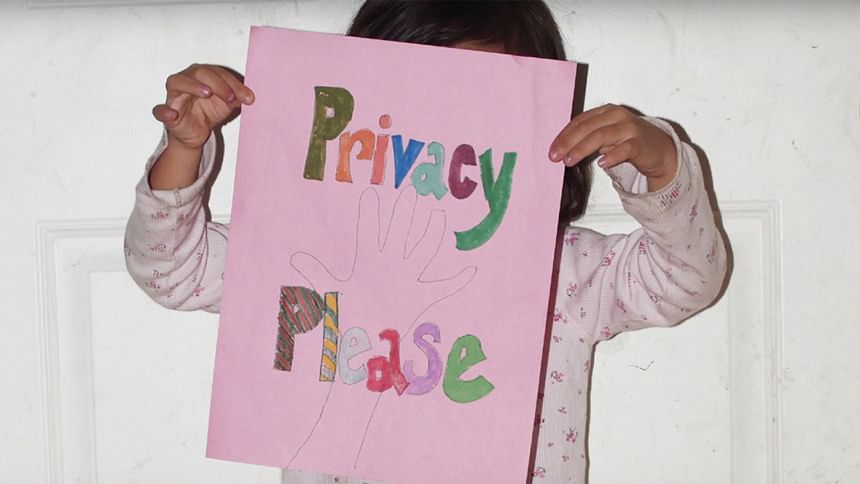Think before posting about your children online

Social media is flooded with children's photos, quotes and videos that are being posted by their parents. Some tend to document everything, from their children's first words, first steps, first days at school to most other activities, conversations, achievements and challenges of their lives. There are even some videos where children are feeling sad or crying.
The above are examples of "sharenting", which refers to the practice of parents publicising content about their children on online platforms. At present, this is common across various countries of the world, including Bangladesh. Sharenting poses child protection risks and raises a lot of questions about privacy, consent and the parent-child relationship.
The disclosure of children's personal information, such as geographic location, name, date of birth, pictures and the schools they attend, might expose them to risks, as people with malicious intent may use this information to harm children. Many share photos of their children in a variety of intimate settings, where they are not properly dressed. Such pictures of children are found on websites for pedophiles. Australia's eSafety Commissioner reports that almost half of all images found on the pedophile image-sharing site he reviewed were originally posted with a parent's consent on social media and family blogs. Sharented information is often abused for "identity theft" when imposters stalk or commit fraud against children, or even blackmail their families.
Due to the prevalence of sharenting, children develop a digital footprint from a young age, over which they have no control. A study by the University of Michigan found that over half of the participants have shared embarrassing content about children online. Twenty-seven percent of them have shared photos that are deemed potentially inappropriate. This might lead to negative consequences. For example, children could be ridiculed at school. Moreover, college/university admission officers and potential employers may happen to access the inappropriate material. This could shape their impression of a candidate and negatively affect academic or career opportunities. Children should be free to define themselves online, on their own terms, without being burdened by the image created by their parents. Sharenting fails to respect children's autonomy over their persona.
Over 55 percent of children said they would not upload news about or images of themselves to their social media feeds. This is according to a survey of over 16,000 students by VotesforSchools (This platform allows students in the UK to vote and comment on issues affecting their lives). Some were concerned about being embarrassed or the longevity of content, which could remain online indefinitely. Others expressed concerns about their personal data being compromised. One of the children said: "Although our parents mean well, sometimes the aftermath of a post can be disastrous."
It is unrealistic to expect that parents will stop sharing about their children altogether. Social media has become a part of everyday life. Sharing can bring families together, especially when they are geographically dispersed. Children also appreciate that. Sometimes, parents can receive support from others through posting.
However, social media is still evolving and there are no fixed rules. Much of it is common sense. As a general rule, sharing should be kept to a minimum. There is a need to resist the temptation to document and post everything. Parents need to keep in mind whether their children will feel ashamed, embarrassed, anxious or annoyed about any of the posts. Is there any potential harm for the child? Will this affect the parent-child relationship?
Children have the right to be protected from all types of harm, which includes the harm caused by sharenting. Sharing personal details of children should be avoided. Parents should try not to show that they have a regular pattern every day and should turn off geo-tagging (which tells internet users where a person is). Simple steps such as checking privacy settings to ensure that the posts could be viewed by trusted friends and family only, and asking others not to share content of the children on their accounts, could be a good start. This does not guarantee that the image or text will not be abused, but parents must do everything they can to protect their children. Parents should not share pictures that show their children in any state of undress (e.g., bathing suit, scant attire).
The most vital aspect to this sort of social media use is to have a child-centred approach. Parents must ensure that they listen to children. By age four, children have an awareness of their sense of self. Parents should ask children if they want friends and family to know about the things being shared. Parents need to understand that children have the right to say "no" regarding images and the text that they post. It is important that parents respect children's views.
The London School of Economics (LSE) has started a project titled "Preparing for a Digital Future". Sonia Livingstone, professor of social psychology in the department of Media and Communications and one of the project's researchers said,"We interviewed several families where even small children wished their parents would share fewer photos, and consult them more. We observed in a few families that children are even learning to tell their parents to stop. It's a matter of respect and consent, and protecting that is important, more than the actual fact of sharing itself. What will matter to children is to feel they have agency, respect and dignity—that's at the heart of privacy. So anyone sharing or using their images should prioritise this."
In Bangladesh, there is a need for research on sharenting and listening to children's perspectives. We can utilise the lessons learnt on sharenting from other countries as well in the best interests of children. Awareness of Bangladeshi parents on the risks of sharenting as well as capacity to minimise harm should be developed.
If parents are sharing online to get likes, then children will learn that posting is a way of being validated, which is negative for their development and wellbeing. It is the responsibility of parents to practice good social media etiquette so that children learn how to behave in online settings and navigating through the digital world becomes an empowering experience for them.
Laila Khondkar is an international development worker.

 For all latest news, follow The Daily Star's Google News channel.
For all latest news, follow The Daily Star's Google News channel. 



Comments